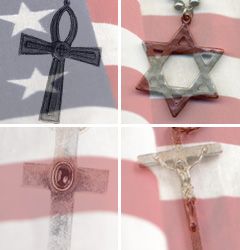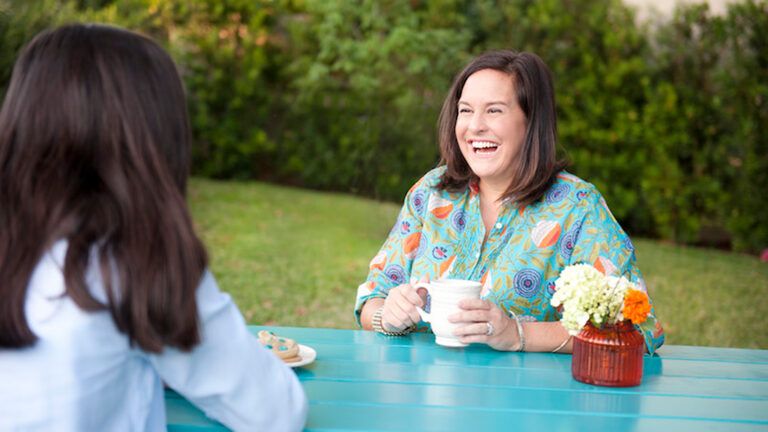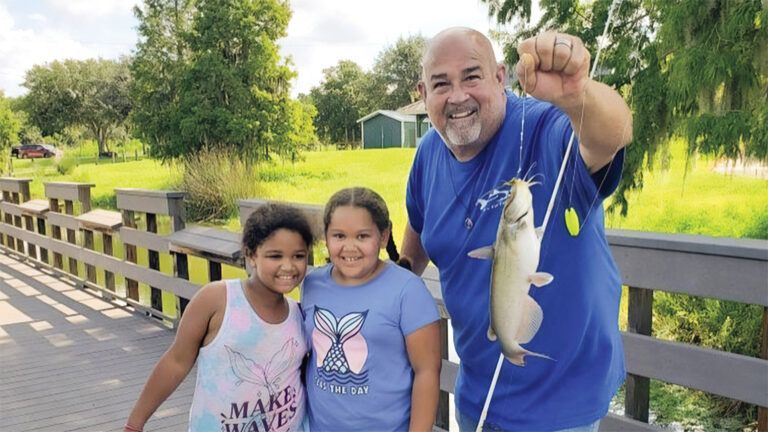On a frigid February night in 1943, the U.S. troop ship Dorchester surged through rough North Atlantic seas about 150 miles off the coast of Greenland.
Down in the old converted cruise ship’s stifling hold, four U.S. Army chaplains circulated among the frightened young men, some lying wide-eyed in their bunks, others nervously playing cards or shooting dice.
Chatting with the troops, the chaplains eased tensions, calmed fears and passed out soda crackers to alleviate seasickness.
The troops anxiously looked forward to reaching Greenland the next day. They knew that U-boats prowled their ship’s course.
They did not know that by morning nearly three fourths of them would be dead, and that the rest would have their lives changed forever. Nor did they know the magnificent way in which these four chaplains would minister to them.
Father John Washington was from a big Irish Catholic immigrant family in New Jersey. At age 12, near death from a throat infection, he was given last rites. Miraculously he recovered. He told his sister: “God must have something special for me to do.”
Alexander Goode came from a long line of rabbis. He remembered standing in Arlington National Cemetery at age 10 watching through tear-filled eyes the Unknown Soldier being laid to rest. After Pearl Harbor he left his temple in York, Pennsylvania, requesting overseas duty.
Clark Poling, a minister in the Dutch Reformed Church, had turned down a law career to carry on his family’s seven-generation heritage of religious service. “Don’t pray for my safe return,” he told his father before embarking on the Dorchester. “Pray that I do my duty.”
“Old man” of the four was George Fox, who had received the Silver Star, Purple Heart and France’s Croix de Guerre in World War I. On returning home, he entered seminary. Ordained a Methodist minister, he served a circuit of small Vermont churches until December 7, 1941.
“I must go,” he told his wife. “I know what these boys are facing.”
Empathy with the troops came naturally to the four chaplains. They became highly popular, mixing easily with all faiths, counseling, organizing entertainment and praying.
On February 3 the chaplains were still up at 12:55 a.m. when the torpedo struck. The tremendous explosion threw soldiers from bunks; the lights went out and the stricken ship listed to starboard, sinking fast.
Those not trapped below rushed topside. Amid the shriek of escaping steam and frantic blasts of the ship’s whistle, dazed men stumbled about the dark, crowded decks. Some gripped the rails, too horror-struck to head toward the lifeboats.
The four chaplains quickly moved among the bewildered men, calming them, directing them to life rafts, urging them to escape the doomed ship.
Many had forgotten their life jackets. The chaplains located a supply in a deck locker and passed them out. When the bin was empty, they pulled off their own and made others put them on.
Only two of the 14 lifeboats were successfully used in abandoning ship. Soldiers leaped into the icy sea. They clutched the gunwales of the two overloaded lifeboats, clung to doughnut-like rafts or floated alone.
The four chaplains remained on the ship’s slanted aft deck, standing together, arms linked, heads bowed in prayer, as the Dorchester slipped beneath the waves.
Of the 902 men aboard, 230 were rescued by two Coast Guard cutters. A British report had stated that survival would be impossible after one-half hour in such cold waters, but some men, insulated by the ship’s thick fuel-oil which coated them, had floated in life jackets for eight hours.
The heroic Four Chaplains have become legend. Memorials to their “Three Faiths, One God” sprang up around the nation to promote brotherhood, fight bigotry and encourage interfaith and interracial unity. So many years later, we at Guideposts wondered about the survivors. What has happened to them?
Thanks to Colonel Archie Roberts, chaplain of the Chapel of Four Chaplains in Valley Forge, Pennsylvania, I was put in touch with a number of survivors.
No one has been able to find any of the four men to whom the chaplains gave their own life jackets. In the mass confusion, those receiving them might not have realized theirs came off a chaplain’s back.
We do know that when John Mahoney started to rush below for his gloves, Rabbi Goode stopped him and gave him his own. Those gloves helped save Mahoney’s life, enabling him to cling to a lifeboat through the night.
It was exciting to talk with the survivors. All say they’ll never forget the Four Chaplains. Some saw them going down with the ship. Others learned of their heroic acts after being rescued.
Most are now in their 70s, retired from active careers. Practically all suffer from numbed limbs and walking difficulties as a result of exposure. They keep in touch with one another through reunions and newsletters.
With high expectations, I asked each survivor: “Has the memory of the Four Chaplains had any effect on your life?”
“Not really,” was the usual answer. But as we continued talking, I began to see that this initial response was one of modesty. For as we discussed their lives, evidence emerged that the men had been affected significantly: In one way or another they had been giving of themselves to help others.
Henry Arnett, of Newport, Arkansas, visits local hospital patients every day. Despite bad legs, he often drives the 180-mile round-trip to Little Rock to cheer patients there.
Thanks to Charles Macli, who now lives in Peekskill, New York, a lot of youngsters in the Bronx, New York, have learned to box in a wholesome gym atmosphere, with some advancing to the Golden Gloves.
In helping keep the Four Chaplains’ memory alive, Walter Miller of Bristol, Connecticut, has written widely distributed poems that honor all those lost in our country’s wars.
And Anthony Naydyhor of Hellertown, Pennsylvania, has devoted the past 12 years to caring for his wife, who is on kidney dialysis. When I suggested that he was showing real selflessness, he shrugged it off. “No,” he said, “it’s a privilege.”
Compassion for others seems to be a guiding factor in these men’s lives.
Edward Dionne of Lake Placid, Florida, volunteers to help blind and needy children. And there’s Daniel O’Keeffe of Sebring, Florida, who helped found a local YMCA; he is a March of Dimes chairman, works with disenfranchised youngsters, and speaks on Judeo-Christian ethics.
The survivors’ spirituality was deepened in different ways. James Ward of Cincinnati says he had little interest in religion before the sinking, but the memory of the chaplains drew him to the church in which he’s active today.
The same goes for Robert Blakely of Alpine, California, who is a lecturer for his Catholic church and, as a Eucharistic minister, serves Communion to housebound parishioners.
But probably what all of the survivors remember most is the example of brotherhood demonstrated by the Four Chaplains. Because of this, Benjamin Epstein of Delray Beach, Florida, lectures on building bridges of understanding between people of all faiths. James McAtamney of Newport News, Virginia, backs him up.
“I was raised in a neighborhood where Jews didn’t speak to Catholics and neither Catholics nor Jews spoke to Baptists. I was amazed to see that these chaplains had so much in common. To see them enjoying one another’s company was a lesson to me in ecumenism long before that word became popular.”
Today “Mac” gives his time to Civitan International, a worldwide community-service club aimed at helping the mentally retarded. Civitan also sponsors Clergy Appreciation Week, celebrated in February to honor ministers of all faiths.
And several—like Walter Boeck-Holt of Algona, Iowa, Charles Ciccia of Manalapan, New Jersey, Dr. Roland Phillips of Abington, Massachusetts, and Michael Warish of Taunton, Massachussets—have written accounts of the sinking, which help keep the memory of the Four Chaplains alive.
Other survivors speak publicly about that terrible night. For many, this is difficult. But the men of the Dorchester feel it is a privilege to honor their comrades and the Four Chaplains so that others will be inspired by their selfless gift.





